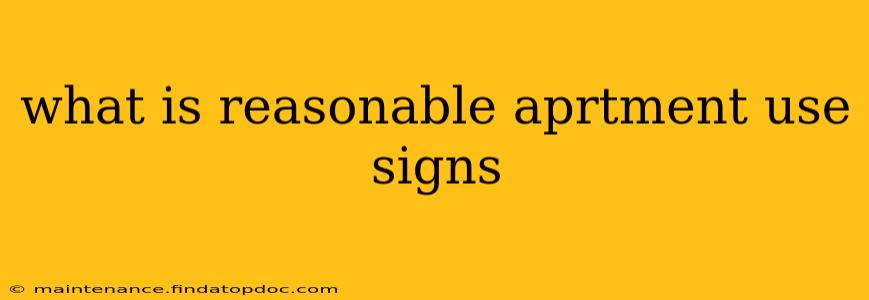What is Reasonable Apartment Use? Signs You Might Be Crossing the Line
Finding the perfect apartment is exciting, but understanding your rights and responsibilities as a tenant is crucial for a harmonious living experience. This includes knowing what constitutes "reasonable apartment use" – a concept that can sometimes be vague and lead to disagreements between tenants and landlords. This article clarifies what constitutes reasonable use and highlights some situations that might be considered unreasonable, potentially leading to lease violations.
What Does "Reasonable Apartment Use" Mean?
"Reasonable apartment use" generally refers to activities that don't significantly disrupt other tenants, violate building rules, or damage the property. It's a balancing act between enjoying your living space and respecting the rights and peace of others in the building. Think of it as the golden rule applied to apartment living: treat your neighbors as you'd like to be treated.
What are Some Signs of Unreasonable Apartment Use?
Several actions can cross the line from reasonable to unreasonable use of your apartment. Let's explore some common scenarios:
Excessive Noise:
This is a frequent source of conflict. While some noise is inevitable in apartment living, excessive noise at unreasonable hours (late nights, early mornings) is a clear violation. This includes loud music, parties, shouting, or constant stomping. The key here is considering the volume and time of day. A quiet conversation at 8 pm is different from a loud party at 2 am.
Illegal Activities:
Any illegal activity on the premises is a major violation of reasonable use. This includes drug use, manufacturing, or distribution; possession of illegal weapons; and any other criminal activity. Landlords have the right and often the responsibility to evict tenants engaged in such activities.
Damage to Property:
Neglecting the property or causing damage beyond normal wear and tear is unacceptable. This includes things like damaging walls, appliances, or fixtures; not reporting necessary repairs promptly; or allowing pets to cause damage. Tenants are generally responsible for repairing damages they cause, beyond normal wear and tear.
Overcrowding:
Many leases specify a maximum occupancy. Exceeding that number is a violation of the lease agreement and could be considered unreasonable use. Overcrowding can lead to increased noise, strain on building resources (like plumbing and parking), and safety concerns.
Storing Hazardous Materials:
Storing flammable materials, explosives, or other hazardous substances in your apartment is a safety risk and a violation of reasonable use. This is often explicitly forbidden in lease agreements. Landlords have the right to inspect and remove such materials.
What are common questions regarding reasonable apartment use?
Here are some frequently asked questions regarding reasonable apartment use:
Can my landlord enter my apartment without notice?
Generally, no. Most jurisdictions require landlords to provide reasonable notice (often 24-48 hours) before entering your apartment, unless there's an emergency (e.g., a leak, a fire). The specific rules vary depending on your location and lease agreement, so it's best to review those documents.
What if my neighbor's unreasonable behavior is affecting me?
You should first attempt to resolve the issue amicably with your neighbor. If that fails, contact your landlord or property management company. They are responsible for mediating disputes between tenants and maintaining a peaceful living environment. If the problem persists, you may have legal recourse, depending on your local laws and lease agreement.
Can I be evicted for unreasonable apartment use?
Yes, absolutely. Repeated violations of reasonable apartment use clauses in your lease can lead to eviction. The process varies by location, but it typically involves written warnings, opportunities to correct the behavior, and finally, eviction proceedings if the problem persists.
How can I ensure I'm using my apartment reasonably?
The best way to ensure reasonable use is to be considerate of your neighbors and follow your lease agreement carefully. Communicate openly, respect quiet hours, and maintain your apartment in good condition. If you're ever unsure about something, it's always best to ask your landlord or property manager for clarification.
By understanding your rights and responsibilities, you can contribute to a pleasant and harmonious living environment for yourself and your neighbors. Remember, respecting others and adhering to your lease agreement is key to maintaining a positive apartment living experience.
